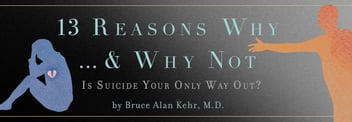Existential Crisis in Teenagers
- Home
- Blog

Amelia’s Story
I received a panicked call from Jane, a stressed-out and frightened mom. Her normally, high-functioning, “perfect” daughter, Amelia, had screamed at her, “I hate you, this house, and everyone in the world. No one understands me and I am going to kill myself!” Jane was shocked. She didn’t know if this was teen “drama” or if this threat should be taken seriously. After engaging in psychotherapy, we would come to discover that Amelia was experiencing an existential crisis.
Jane explained to me what had been going on with Amelia over the past few months. Amelia had begun to isolate from her and the rest of the family. Everything Jane did or said seemed to make Amelia embarrassed, upset, angry and she often stormed to her room in tears. Amelia struggled to get out of bed for school every day, when before, it was only a mild annoyance to wake up early. Amelia was nearly a straight-A student and showed pride in her good grades – why did she suddenly stop wanting to go to school?
While things were usually just fine at school, Jane got a disturbing call from Amelia’s AP Chemistry teacher. The teacher expressed her concern that Amelia missed the mid-term test and she was in danger of failing the class. She was also concerned that Amelia had missed several classes over the past month. Jane was truly surprised since this was Amelia’s favorite class and teacher.
There was more to the story. Amelia had recently quit the volleyball team declaring the game, and all games, “idiotic.” Jane worried about all the absences from school, her grades and just how unhappy and inconsolable she had become. With all these things happening so quickly and being such a drastic change from her “normal” happy well-adjusted self, Jane went from concerned and frustrated to very alarmed. What was going on with her child, she wondered? Did I do something wrong? What suddenly changed?
A deep gulf was widening between her and Amelia and despite her attempts to reach out and try to help – she felt she only made matters worse. She needed outside help. Jane felt she could no longer deal with this on her own and was scared. I agreed with her that Amelia was in pain and her actions and expressions showed it. I recommended a consultation to get a clearer, more definitive picture.
Teenage Angst
The teenage years are difficult for almost everyone. A roller coaster time of growth and change – physically, emotionally, and mentally. How do you know when your child is experiencing a serious “existential crisis” or when it is just “normal” teenage angst? During the teen years, children physically turn into adults, however, their emotional maturity requires a few more years of experience. Teens are generally self-absorbed with all this emotional and physical change. They are more conscious of how they look and their raging hormones are creating emotional instability. They are also becoming sexually aware and this adds to their confusion and feelings of insecurity.
As children begin the journey into adulthood and greater independence, the road is often bumpy. This is all part of growing up and normal. However, when the road becomes treacherous, seeking professional help can be critical.
What is an Existential Crisis?
Wikipedia has a good, easy to understand definition. “An existential crisis is a moment at which an individual questions the very foundations of their life: whether this life has any meaning, purpose, or value.”[1] This can occur suddenly or slowly build momentum until the child reaches such despair they begin to think about suicide. An existential crisis occurs when you feel ungrounded or adrift in the world. Previously held beliefs in values, faith and purpose seemed to have become pointless. Isolation, anxiety and depression all converge into a painful state of being.
What Can Warning Signs Look Like?
Your child may be on the verge of an existential crisis if he or she begin questioning the meaning or purpose of life, or expressing there is no point in doing anything. Look for signs of:
- Isolation from family and friends
- Disinterest in activities they usually enjoy
- Slipping or failing grades when once they excelled
- Saying there is no purpose or meaning in their life
- A tragic event that makes the world order seem senseless – like a sudden death.
- Expressing thoughts of suicide
- Drug or alcohol use
Listen to your child and be aware of their feelings, emotions, and struggles. They are transforming into independent human beings and striving to establish their own identity. Your teen may act like they don’t need you, but nothing could be further from the truth.
Tips for Parents
If you think your child may be experiencing an existential crisis, the following tips may be useful.
- Professional Help: Have your child engage in psychotherapy.
- Try to loosen the reins: Realize you simply can’t control everything your child does and thinks. Listen empathically and accept the fact that they are individuals with their own hopes and dreams that may be quite different than yours.
- Encourage communication: While it can be difficult, strive for open, non-judgmental communication with your child. Ask them how their life is going, and how they are feeling about things at school and at home, while acknowledging your wish not to intrude upon their life and their need for a private life. Engage them in a conversation around any important decision you are trying to make with respect to their present or future. When you need to mete out a punishment for bad behavior on their part, ask them first what they believe would be ‘reasonable’. Listen to their answers and validate them by considering it.
- Reassure your love: Reassure them that you will always love them, and be there to listen, provide emotional support, and try to understand what they are living through.
.png?width=144&height=144&name=Untitled%20design%20(34).png)



